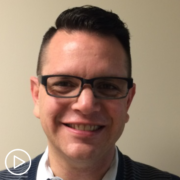Who Are the Members of a CAR T-Cell Therapy Team?
Who Are the Members of a CAR T-Cell Therapy Team? from Patient Empowerment Network on Vimeo.
Who are the members of a CAR T-cell therapy care team? Expert Sarah Meissner provides an overview of healthcare team members and how they support patients during the CAR T-cell therapy process.
Sarah Meissner, RN, BSN, BMTCN, is a Blood and Marrow Transplant and Related Donor Search Coordinator at the Colorado Blood Cancer Institute.
See More from The Care Partner Toolkit: CAR T-Cell Therapy
Related Resources:

CAR T-Cell Therapy Care Partners: What Questions Should Your Ask the Healthcare Team? |

|

CAR T-Cell Therapy Care Partners | What Do You Need to Know About the Process? |
Transcript:
Katherine:
So, let’s begin by learning more about Sarah’s role. Sarah, can you explain what you do as a transplant coordinator at CBCI?
Sarah Meissner:
Of course. So, I like to say that as a coordinator, I am kind of the travel agent of the CAR T process. So, I meet with the patients when they are determined to be a candidate for CAR T-cell therapy.
And I act as kind of the intermediary between the patient and the care team. I help them get set up for all of their appointments as well as provide education for what’s going to be occurring.
Katherine:
Okay. So, when someone is undergoing CAR T-cell therapy, who are the essential members on their healthcare team besides you?
Sarah Meissner:
We have a pretty big care team. So, of course, we have the physician who is kind of at the helm for determining the care plan. We also have financial coordinators, social workers, dieticians, as well as the nursing team who will be providing the care to the patient.
Katherine:
So, how many people could be on a team?
Sarah Meissner:
It could be as many as 10. It just depends on the individual patient’s needs and how different people can help.
Katherine:
How do you, specifically, work with CAR T-cell patients and care partners?
Sarah Meissner:
So, I am their main contact during the process. So, any questions that come up that I can help with, I’m there via phone, email, in-person meetings. I also am big in education. So, sitting with the patient when they’re in clinic and helping them understand what this treatment is, why we’re doing it, what they can expect and just helping them through the process.








